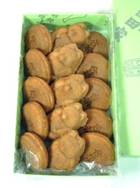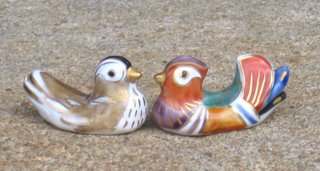Haiku with 100 Years 百年の俳句
Haiku mit Hundert
Dear Haiku Friends,
In the January Edition 2004 of the Asahi Haiku Magazine, there was a special about Haiku from persons older than 90, collecting 612 from all over Japan! This was the second time the magazine had called on the elderly to submit their haiku. The oldest person to submit his haiku was Mr. Nakamura, age 106!

I have randomly selected 20 of the poems and translated them rather literally into English and German. Members of WHCgerman then helped with the improvement of the translations, which will be introduced below.
I thank all the members of WHCgerman who helped with the translation.
The haiku are all very impressive and inspiring, introduced with a motto of the person who wrote it. Most are long-term haijin with a group or magazine of their own, some have started at old age in an old-peoples home or group for the elderly, coming to great perfection in a short period of time. All seem to enjoy the small things in life filtered through haiku shared with people of the same interest.
If a haiku a day keeps us healthy until 90 and well over, then we are all sharing a very good hobby, I think. I hope to be back here in 50 years!
Enjoy some impressions of our SENSEI (the ones born before we were) from Japan.
The oldest person to submit his haiku was Mr. Nakamura, age 106! His slogan in life is threefold: to love, to start something new, to endure.
waga iki no
kagayaki noboru
shabondama
my breath
shimmering, ascending -
soap bubbles
mein Atem
schimmernd, aufschwebend -
Seifenblasen
*
Zawai san is 97 years old. His motto is still: To meet my real self! But in the following haiku another motto seems to show too:
http://happyhaiku.blogspot.com/2005/04/anemones.htm
tsuyu no tama
korogaru toki wa
tamerawazu
a drop of dew -
when it rolls around
it does not hesitate
ein Tautropfen -
wenn er so rollt
zoegert er nicht
tsuyu no tama : could be singular or plural, but I felt it is Zawai san himself, rolling in the ups and downs of fate, never hesitating, accepting where it rolls.
*
The next one shows an old lady, Isoki san, copying sutras, one of the pastimes to prepare for the next life. She is 93 years and her motto is still: Optimism in all things.
shakyo no te
yasumete kikinu
semi no koe
resting the hand
from copying sutras -
cicada’s song
Die Hand haelt inne
beim Sutrenkopieren –
Zikadenzirpen
*
Nagatomo san writes about his haiku life together with his wife. Now he is 91 years old and all alone, but he still remembers his wife fondly. His motto is: To be grateful, to be kind and gentle.
futari shite
ayumishi michi
kiri no hana
the two of us
walked this road –
blue paulownia
Wir beide
gingen diesen Weg –
blaue Paulownia

http://www.hana300.com/kiri00.html
*
Kondo san is 92 and a mother of many children. Her best times are spent with all of them together.
haha no hi ya
kuukobin nite
ran no hana
Mothers day -
arriving with airmail
the orchids
Muttertag -
mit Luftpost kommen
die Orchideen
*
Sugiura san is 97, but his heart is always that of a youngster, even if the ears will not hear well, the eyes will not see well any more and the skin is full of wrinkles. The haiku of his wife is introduced next.
ikaserete
kyuujuunana sai
aki higan
given to life
for 97 years -
autumn equinox
durchs Leben gefuehrt
seit 97 Jahren -
Herbstsonnwende
ikasarete could be translated as „living in Gods hands“, it evokes a strong feeling of being at the mercy of higher powers, but in a positive, grateful sense. Issa in his haiku often uses the phrase “anata-makase”.
Autumn Equinox
*
Sugiura Natsu, wife of the above poet, is 94, and her motto is “Caring for others”, like a gentle mother.
kuruma-isu
osu ase otto ni
misemajiku
pushing the wheelchair
but never dare to show my sweat
to my husband
den Rollstuhl schieben
traue mich nicht, den Schweiss
meinem Mann zu zeigen
*
Asano san is 90 years and likes to live a normal, undisturbed life. His hobby is fishing, as you can see.
fune ukabe
himemasu tsuri ya
fuji biyori
floating in a boat
fishing for trout -
Mount Fuji in sunshine
im Boot schaukeln
nach Forellen fischen -
der Fuji im Sonnenschein
himemasu is a sort of salmon-trout, the direct rendering would be : princess trout, which evokes nice memories in Japanese. Mount Fuji is sourrounded by five big lakes, where you can rent a boat and spend a sunny afternoon just watching this splendid mountain while catching a morsel for dinner.
*
Watanabe san is a healthy 97 and sings his haiku in a traditional style. He likes to visit temples and spend a quiet time there.
zoo-in ni
koohaku no bara
kiyoi saku
at the monastery
white and red roses
blooming in competition
im Kloster
weisse und rote Rosen
bluehen um die Wette
*
Murai san is 94 and lives in Kyoto, where he enjoys the delicacy and refinement of the old town life.
choochin ni
ayu no hitomoji
kyoo no yoi
on the lantern
the character “sweetfish” -
evening in Kyoto
auf der Laterne
das Schriftzeichen “Bachforelle“ -
Abend in Kyoto
Here is a paper lantern with a dragon.

http://www.netwave.or.jp/~cyouchin/image91.jpg
*
Ono san is 91 and takes life easy and happy. And he still has a sweet tooth.
uraraka ya
ningyoo-yaki o
kau retsu ni
fine spring day -
standing in line to buy
sweet delicacies
strahlender Fruehlingstag -
Anstehen in der Schlange
fuer Suessigkeiten
ningyoo-yaki is a sort of buns in the form of human figures or animals, filled with sweet been paste and a favorite with children. When fried at a stall during a festival, all are waiting in line in the sweet smell until a fresh bunch is ready.

http://rnet-jp.com/shopping/goods_img/1100_ph.jpg
AME, DAGASHI Sweets
*
Fukoku san is 90 and likes to live in peace with her big family. She also still counts her beads of the abacus.
itsutsu-tama
no soroban futoshi
shin-cha susuru
five beads
of the abacus so big -
slurping new tea
fuenf Kugeln
des Abakus so gross -
neuen Tee schluerfen
shin-cha is the first tea of a new harvest in spring and quite a delicacy, to be slurped in peace and appreciation.
Soroban, Abacus
*
Yoshida san is 90 and likes to meet people, taking each meeting as a special, unique event to cherish (ichi-go, ichi-e: one encounter, one chance).
sangurasu
kakete kishi ko o
michigaeri
wearing sunglasses
the child is coming -
I can not recognize who
mit Sonnenbrille
kommt das Kind herbei -
nicht zu erkennen
mi-chigaeru can also mean to mistake someone for someone else. So Grandmother is probably mistaking one of her grandchildren.
*
Ueda san is 99 and still makes efforts and exerts herself. Then at night it is time for a relaxing bath.
tsutsuganaku
yuzu-yu ni tsukaru
hyakuju ware
in good health
lying in the hot citron bath
me one hundred years
in guter Gesundheit
im heissen Zitronenbad
mit meinen Hundert
Yuzu yu is a bathtub filled with a special Japanese yellow citron fruit (yuzu) with a strong, envigorating smell to help ward off cold in winter. The dried peel of yuzu is also used as a food addition to enhance the taste of soup and other dishes. (It is one of my favorite Japanese flavors.)
*
Suzuki san is 91 and likes a serious, straighforward mind not to be disturbed by the vicissitudes of life. At his age, he has learned to enjoy the small things, one at a time.
posuto made
arukete ureshii
kiku biyori
to the mailbox
I could walk, I am so happy -
sunshine on the chrysanthemums
bis zum Briefkasten
konnte ich laufen, ich bin so froh -
Sonnenschein auf den Chrysanthemen

http://www.hana300.com/kiku00.html
Chrysanthemum
Published in the WHR Winter 2004 Edition
http://www.worldhaikureview.org/4-1/whcgerman-p2.htm
************************
Please send your contributions to Gabi Greve
Happy Haiku Discussion Group
To the Daruma Museum Index
http://darumasan.blogspot.com/
To the Worldkigo Database
http://worldkigodatabase.blogspot.com/








2 comments:
Amazing Collection Gabi san. I am so honoured to be a reader of these Great Haiku by elders. Profound Gratitude.
Simply astounding Gabi.
It shows you truly care for the aged.
Hats off ma'am!
kala ramesh
Post a Comment